Featured Articles
@Max(imum) Kellerman
Editor’s note: The following letter to Max Kellerman is being posted on behalf of the author, Dino da Vinci.
Dear Sir:
A short time ago, you had erroneously referred to us Patriots fans as amongst the dumbest fans in sports.
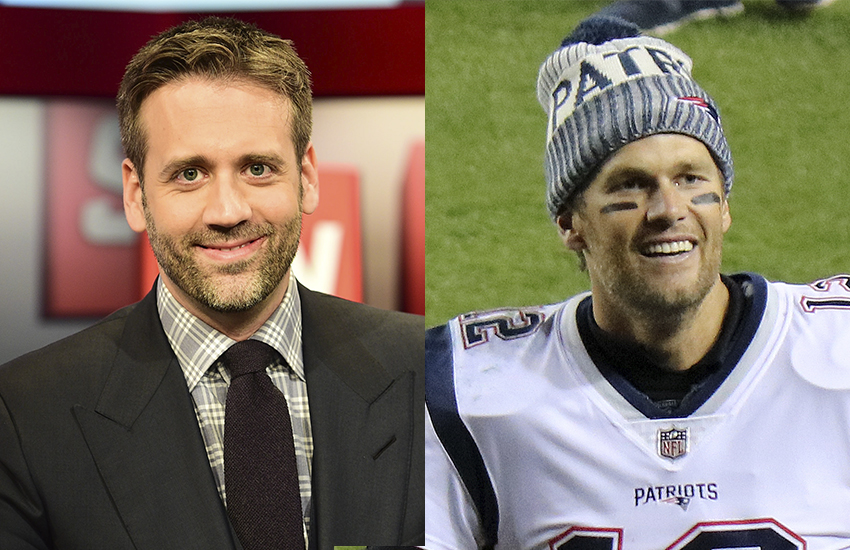
Editor’s note: The following letter to Max Kellerman is being posted on behalf of the author, Dino da Vinci.
Dear Sir:
A short time ago, you had erroneously referred to us Patriots fans as amongst the dumbest fans in sports.
I initially saw it as an attempt to keep the ratings up, figuring you were toeing the company line. You were being a good soldier, doing as you were told, and it would be a one and done kinda thing.
What I thought to be only a snack, however, is turning into an eleven-course meal.
Max, your comments have triggered an inundation of phone calls, emails, texts, faxes, telegraphs, courier pigeons, et al., all stating something to the effect of “Hey D, you know this guy, you need to have a little chat with him.” After backpedaling profusely, I explained that, while I am well aware of you, I in no way know you. Nor do I know Roger “Ideal Gas Law” Goodell, or Chris Mortenson (yeah, you’re a respected journalist), Jane Rosenberg (at least you got it right with your second opportunity), or Bernard Pollard (we realize it was an unfortunate injury in the course of doing your job, but it hurts no less).
Max, I’m officially addressing you on behalf of New England Patriots fans everywhere. Simply put, if we don’t receive a sincere and heartfelt apology, you’ll be forcing us to make you an idiom.
As I plan on living forever, what follows is a conversation I will most likely be having in the future, with one of my great-great-great-great-great-great-granddaughters.
Circa 2132 AD
Maria Angelica (age 6): “Multi-great-GrandPapa D, what’s the origin of the term “kellerman” or “at kellerman? My teacher told me you’d be the perfect person to ask.
DdaV: “You mean like when people said there was no such thing as global warming and now people say, “Wow, they really kellerman’d that one”, like that? It’s all true. Why, in fact, we used to have big white bears called polar bears…”
MA: (gasps) “Wow! Like an Abdominablable Snowman?”
DdaV: “Sorta. And large, beautiful marine turtles…”
MA: (gasps) “Really?! Like Michelangelo, Donatello, Raphael and Leonardo.”
DdaV: “Yeah, sure. And penguins…”
MA: (Gasps) “Last Christmas Santa brought me a book entitled ‘From the First Dodo Bird to the Last One of What May Have Been as Many as 20 Different Species of Penguins: The History of the Flightless Bird and What it Says About Us Now That They’re All Gone. A Reflection.'”
DdaV: “A bit wordy, but my very point. And Colorado, Utah, Nevada, and California…”
MA: “Types of fish that couldn’t acclimate to the warming of the oceans?”
DdaV: “No, those were actual states that were part of the United States of America. Now we just have the “Somewhat, Mostly United States of America.”
MA: “Or when people said that artificial intelligence would only help us as a people and today our world leader is a killer bot named X28-3-1501-49-0, or as he likes to call himself, Fluffy?”
DdaV: “Exactly.”
MA: “And the origin of the saying?”
D da V: “It’s an expression you don’t hear as much anymore. It harks back to well over 100 years ago when a man they let talk into a microphone by the name of Max Kellerman figured he’d get a jump on the demise of quarterback Tom Brady and the New England Patriots.”
MA: “That was a real man?”
D da V: “Uh, well… some would argue, but I would say so. Anyway, back to what happened. Max Kellerman was a grown-up man who made a big mistake and refused to admit that he was wrong, even when he knew that he was wrong.”
MA: “Like last year in kindergarten when Timmy put the goldfish on the hampster wheel and stated that it disproved the evolutionary process because Goldy needed to sprout legs, but evidently didn’t grow them?”
DdaV: “Let’s make that a topic for another day. Back to Max. You see, he called the Patriots’ fans dumb for believing in their quarterback, Tom Brady. In 2016, Mr. Kellerman said Brady would “be a bum in short order,” and in 2017 he said he would “fall off a cliff.” Basically, he said that Brady wasn’t going to be good at his job any more, and that he was just okay. Well, in 2017 Tom Brady won another Super Bowl, his fifth, sixth or seventh Super Bowl win up to that point. It really starts to blur at around that time.”
MA: “Was that Tom Brady related to the Tom Brady who is quarterbacking the Patriots today, Papa D?”
D da V: “To answer your question, yes, it is in fact the very same Tom Brady. What “at Maximum Kellerman” refers to is how fast can you come to the wrong conclusion, and how long you can stay wrong even after reality and/or science has proven you’re wrong, sort of like the flat earth concept. Here’s a guy, Max, who was wrong, it was proven that he was wrong, and then he kept re-upping on being wrong, while continually being re-proven that he had remained wrong. Actually, it was initially called “at Wicked Maximum Kellerman”, as it was a New England thing until it went global, and then they dropped the Wicked, then later in some places the max, or maximum, much like how The Mystic Knights of the Oingo Boingo was shortened to Oingo Boingo, then later just Boingo.”
MA: “Huh?”
D da V: “Not important. The point is, the phrase became a way to slight somebody, in reference to how long do you really want to be wrong and stay wrong before finally admitting it.”
MA: “Did he finally admit it? That he was wrong?”
DdaV: “No, he passed without ever admitting his mistake. His head actually exploded* on Intergalactic MuskSee TV when Brady completed a pass to Rob Gronkowski IV in Fluffy knows what Super Bowl, completing a 38-point comeback with no time remaining on the clock; a performance exceeding his 35-point comeback some thirty years prior. Seems Max made it personal and that’s why very little is ever mentioned about his actual career as a sports commentator, which is someone who talks about sports. Seems he knew so much about one sport, boxing, that they just let him talk about other sports and athletes too, even though he evidently knew nothing about them. I mean, he had to know that a 40-year-old who lived right, trained right, ate right, and studied the opposition meticulously could compete to at least the age of 50.”
MA: “You’re describing Tom Brady, right?”
DdaV: “Actually, I was referring to Bernard Hopkins. A boxing champion around so long they were forced to issue him a new nickname because, along with Floyd Mayweather, they wore out their original ones. Max, amazingly knowledgeable in one sport, chose to veer out of his lane, and in his case, into oncoming traffic, namely Patriots Nation. So rather than being remembered for being special in one area, he was berated for being horribly wrong for an insanely long period of time. It was actually one of Albert Einstein’s lesser known theories, (HWxiLPoT)/w=mKellerman2. It would later be renamed simply Kellerman.”
MA: “But that’s so mean. That makes the poor man who they let talk into the microphone sound like a maxhead, and that’s sad.”
DdaV: “Uh, actually, maxhead, er, yeah…Well, he brought it about himself. You see, we gave him an opportunity to apologize and admit that he was wrong, but he refused to be honest with himself and to tell the truth, he just kept re-upping. Maria Angelica, if you’re wrong, it’s important to find the courage within yourself to admit your mistake and move forward. We must always be honest to both ourselves and others; always tell the truth.”
MA: “Maybe the poor man who got to speak into the microphone wasn’t given this quality advice as a child, or as a grown-up?”
DdaV: “Could be. Maybe.”
MA: “Multi-Great Grandpapa D, thanks for the history lesson.”
DdaV: “Love You boo.”
Max, we’ll be having our annual end of football season meeting mid-February at The Razor and we will decide how we’re going to treat you going forward. At Patriots Nation, we can be a very unforgiving group. You might want to get your mea culpa in early, and I would hope that we can find it in our collective heart to look the other way, this one time.
This. One. Time.
Most Sincerely,
Dino da Vinci
*Some people, mostly fans or descendants from what was once the New England region, assert their belief that implosion, not explosion, was the actual cause of death. There is, of course, a third possibility, that there was an implosion occurring just as the explosion happened. And while this rarity of all rarities certainly would have been named Kellerman, the @maxkellerman referring to being “amazingly wrong for amazingly long” was already so deeply ingrained in the public’s consciousness, that it would simply be too confusing to add the Kellerman Conclusion (Implosion/Explosion) to the already existing Kellerman Conclusion (that old guys get old…except when they don’t.)
To comment on this article at The Fight Forum, CLICK HERE.
Featured Articles
Thomas Hauser’s Literary Notes: Johnny Greaves Tells a Sad Tale
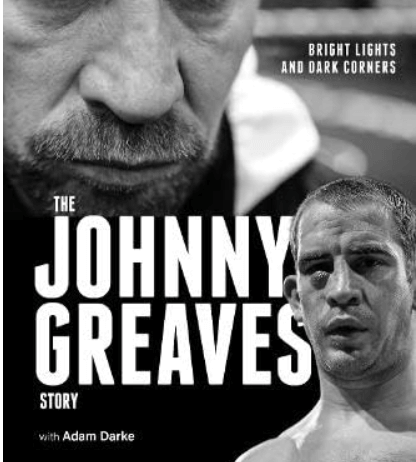
Johnny Greaves was a professional loser. He had one hundred professional fights between 2007 and 2013, lost 96 of them, scored one knockout, and was stopped short of the distance twelve times. There was no subtlety in how his role was explained to him: “Look, Johnny; professional boxing works two ways. You’re either a ticket-seller and make money for the promoter, in which case you get to win fights. If you don’t sell tickets but can look after yourself a bit, you become an opponent and you fight to lose.”
By losing, he could make upwards of one thousand pounds for a night‘s work.
Greaves grew up with an alcoholic father who beat his children and wife. Johnny learned how to survive the beatings, which is what his career as a fighter would become. He was a scared, angry, often violent child who was expelled from school and found solace in alcohol and drugs.
The fighters Greaves lost to in the pros ran the gamut from inept local favorites to future champions Liam Walsh, Anthony Crolla, Lee Selby, Gavin Rees, and Jack Catterall. Alcohol and drugs remained constants in his life. He fought after drinking, smoking weed, and snorting cocaine on the night before – and sometimes on the day of – a fight. On multiple occasions, he came close to committing suicide. His goal in boxing ultimately became to have one hundred professional fights.
On rare occasions, two professional losers – “journeymen,” they’re called in The UK – are matched against each other. That was how Greaves got three of the four wins on his ledger. On September 29, 2013, he fought the one hundredth and final fight of his career against Dan Carr in London’s famed York Hall. Carr had a 2-42-2 ring record and would finish his career with three wins in ninety outings. Greaves-Carr was a fight that Johnny could win. He emerged triumphant on a four-round decision.
The Johnny Greaves Story, told by Greaves with the help of Adam Darke (Pitch Publishing) tells the whole sordid tale. Some of Greaves’s thoughts follow:
* “We all knew why we were there, and it wasn’t to win. The home fighters were the guys who had sold all the tickets and were deemed to have some talent. We were the scum. We knew our role. Give some young prospect a bit of a workout, keep out of the way of any big shots, lose on points but take home a wedge of cash, and fight again next week.”
* “If you fought too hard and won, then you wouldn’t get booked for any more shows. If you swung for the trees and got cut or knocked out, then you couldn’t fight for another 28 days. So what were you supposed to do? The answer was to LOOK like you were trying to win but be clever in the process. Slip and move, feint, throw little shots that were rangefinders, hold on, waste time. There was an art to this game, and I was quickly learning what a cynical business it was.”
* “The unknown for the journeyman was always how good your opponent might be. He could be a future world champion. Or he might be some hyped-up nightclub bouncer with a big following who was making lots of money for the promoter.”
* “No matter how well I fought, I wasn’t going to be getting any decisions. These fights weren’t scored fairly. The referees and judges understood who the paymasters were and they played the game. What was the point of having a go and being the best version of you if nobody was going to recognize or reward it?”
* “When I first stepped into the professional arena, I believed I was tough. believed that nobody could stop me. But fight by fight, those ideas were being challenged and broken down. Once you know that you can be hurt, dropped and knocked out, you’re never quite the same fighter.”
* “I had started off with a dream, an idea of what boxing was and what it would do for me. It was going to be a place where I could prove my toughness. A place that I could escape to and be someone else for a while. For a while, boxing was that place. But it wore me down to the point that I stopped caring. I’d grown sick and tired of it all. I wished that I could feel pride at what I’d achieved. But most of the time, I just felt like a loser.”
* “The fights were getting much more difficult, the damage to my body and my psyche taking longer and longer to repair after each defeat. I was putting myself in more and more danger with each passing fight. I was getting hurt more often and stopped more regularly. Even with the 28-day [suspensions], I didn’t have time to heal. I was staggering from one fight to the next and picking up more injuries along the way.”
* “I was losing my toughness and resilience. When that’s all you’ve ever had, it’s a hard thing to accept. Drink and drugs had always been present in my life. But now they became a regular part of my pre-fight preparation. It helped to shut out the fear and quieted the thoughts and worries that I shouldn’t be doing this anymore.”
* “My body was broken. My hands were constantly sore with blisters and cuts. I had early arthritis in my hip and my teeth were a mess. I looked an absolute state and inside I felt worse. But I couldn’t stop fighting yet. Not before the 100.”
* “I had abused myself time after time and stood in front of better men, taking a beating when I could have been sensible and covered up. At the start, I was rarely dropped or stopped. Now it was becoming a regular part of the game. Most of the guys I was facing were a lot better than me. This was mainly about survival.”
* “Was my brain f***ed from taking too many punches? I knew it was, to be honest. I could feel my speech changing and memory going. I was mentally unwell and shouldn’t have been fighting but the promoters didn’t care. Johnny Greaves was still a good booking. Maybe an even better one now that he might get knocked out.”
* “Nobody gave a f*** about me and whether I lived or died. I didn’t care about that much either. But the thought of being humiliated, knocked out in front of all those people; that was worse than the thought of dying. The idea of being exposed for what I was – a nobody.”
* “I was a miserable bastard in real life. A depressive downbeat mouthy little f***er. Everything I’ve done has been to mask the feeling that I’m worthless. That I have no value. The drinks and the drugs just helped me to forget that for a while. I still frighten myself a lot. My thoughts scare me. Do I really want to be here for the next thirty or forty years? I don’t know. If suicide wasn’t so impactful on people around you, I would have taken that leap. I don’t enjoy life and never have.”
So . . . Any questions?
****
Steve Albert was Showtime’s blow-by-blow commentator for two decades. But his reach extended far beyond boxing.
Albert’s sojourn through professional sports began in high school when he was a ball boy for the New York Knicks. Over the years, he was behind the microphone for more than a dozen teams in eleven leagues including four NBA franchises.
Putting the length of that trajectory in perspective . . . As a ballboy, Steve handed bottles of water and towels to a Knicks back-up forward named Phil Jackson. Later, they worked together as commentators for the New Jersey Nets. Then Steve provided the soundtrack for some of Jackson’s triumphs when he won eleven NBA championships as head coach of the Chicago Bulls and Los Angeles Lakers.
It’s also a matter of record that Steve’s oldest brother, Marv, was arguably the greatest play-by-play announcer in NBA history. And brother Al enjoyed a successful career behind the microphone after playing professional hockey.
Now Steve has written a memoir titled A Funny Thing Happened on the Way to the Broadcast Booth. Those who know him know that Steve doesn’t like to say bad things about people. And he doesn’t here. Nor does he delve into the inner workings of sports media or the sports dream machine. The book is largely a collection of lighthearted personal recollections, although there are times when the gravity of boxing forces reflection.
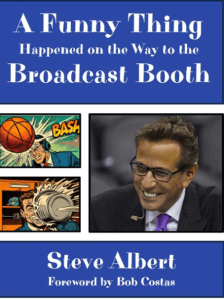
“Fighters were unlike any other professional athletes I had ever encountered,” Albert writes. “Many were products of incomprehensible backgrounds, fiercely tough neighborhoods, ghettos and, in some cases, jungles. Some got into the sport because they were bullied as children. For others, boxing was a means of survival. In many cases, it was an escape from a way of life that most people couldn’t even fathom.”
At one point, Steve recounts a ringside ritual that he followed when he was behind the microphone for Showtime Boxing: “I would precisely line up my trio of beverages – coffee, water, soda – on the far edge of the table closest to the ring apron. Perhaps the best advice I ever received from Ferdie [broadcast partner Ferdie Pacheco] was early on in my blow-by-blow career – ‘Always cover your coffee at ringside with an index card unless you like your coffee with cream, sugar, and blood.’”
Writing about the prelude to the infamous Holyfield-Tyson “bite fight,” Albert recalls, “I remember thinking that Tyson was going to do something unusual that night. I had this sinking feeling in my gut that he was going to pull something exceedingly out of the ordinary. His grousing about Holyfield’s head butts in the first fight added to my concern. [But] nobody could have foreseen what actually happened. Had I opened that broadcast with, ‘Folks, tonight I predict that Mike Tyson will bite off a chunk of Evander Holyfield’s ear,’ some fellas in white coats might have approached me and said, ‘Uh, Steve, could you come with us.'”
And then there’s my favorite line in the book: “I once asked a fighter if he was happily married,” Albert recounts. “He said, ‘Yes, but my wife’s not.'”
“All I ever wanted was to be a sportscaster,” Albert says in closing. “I didn’t always get it right, but I tried to do my job with honesty and integrity. For forty-five years, calling games was my life. I think it all worked out.”
Thomas Hauser’s email address is thomashauserwriter@gmail.com. His next book – The Most Honest Sport: Two More Years Inside Boxing – will be published this month and is available for preorder at:
https://www.amazon.com/Most-Honest-Sport-Inside-Boxing/dp/1955836329
In 2019, Hauser was selected for boxing’s highest honor – induction into the International Boxing Hall of Fame.
To comment on this story in the Fight Forum CLICK HERE
Featured Articles
Argentina’s Fernando Martinez Wins His Rematch with Kazuto Ioka
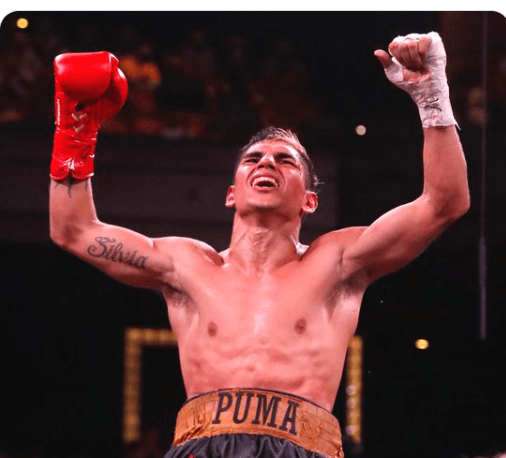
In an excellent fight climaxed by a furious 12th round, Argentina’s Fernando Daniel Martinez came off the deck to win his rematch with Kazuto Ioka and retain his piece of the world 115-pound title. The match was staged at Ioka’s familiar stomping grounds, the Ota-City General Gymnasium in Tokyo.
In their first meeting on July 7 of last year in Tokyo, Martinez was returned the winner on scores of 117-111, 116-112, and a bizarre 120-108. The rematch was slated for late December, but Martinez took ill a few hours before the weigh-in and the bout was postponed.
The 33-year-old Martinez, who came in sporting a 17-0 (9) record, was a 7-2 favorite to win the sequel, but there were plenty of reasons to favor Ioka, 36, aside from his home field advantage. The first Japanese male fighter to win world titles in four weight classes, Ioka was 3-0 in rematches and his long-time trainer Ismael Salas was on a nice roll. Salas was 2-0 last weekend in Times Square, having handled upset-maker Rolly Romero and Reito Tsutsumi who was making his pro debut.
But the fourth time was not a charm for Ioka (31-4-1) who seemingly pulled the fight out of the fire in round 10 when he pitched the Argentine to the canvas with a pair of left hooks, but then wasn’t able to capitalize on the momentum swing.
Martinez set a fast pace and had Ioka fighting off his back foot for much of the fight. Beginning in round seven, Martinez looked fatigued, but the Argentine was conserving his energy for the championship rounds. In the end, he won the bout on all three cards: 114-113, 116-112, 117-110.
Up next for Fernando Martinez may be a date with fellow unbeaten Jesse “Bam” Rodriguez, the lineal champion at 115. San Antonio’s Rodriguez is a huge favorite to keep his title when he defends against South Africa’s obscure Phumelela Cafu on July 19 in Frisco, Texas.
As for Ioka, had he won today’s rematch, that may have gotten him over the hump in so far as making it into the International Boxing Hall of Fame. True, winning titles in four weight classes is no great shakes when the bookends are only 10 pounds apart, but Ioka is still a worthy candidate.
To comment on this story in the Fight Forum CLICK HERE
Featured Articles
Emanuel Navarrete Survives a Bloody Battle with Charly Suarez in San Diego
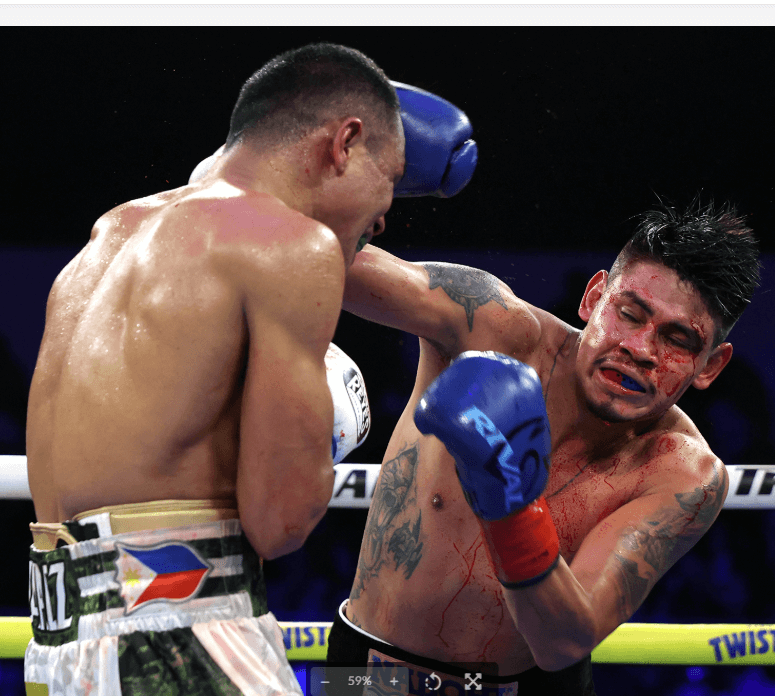
In a torrid battle Mexico’s Emanuel “Vaquero” Navarrete and his staccato attack staved off the herky-jerky non-stop assaults of Philippine’s Charly Suarez to win by technical decision and retain the WBO super feather world title on Saturday.
What do they feed these guys?
Navarrete (40-2-1, 32 KOs) and his elongated arms managed to connect enough to compensate against the surprising Suarez (18-1, 10 KOs) who wowed the crowd at Pechanga Arena in San Diego.
An accidental clash of heads opened a cut on the side of Navarrete’s left eye and forced a stoppage midway through the fight.
From the opening round Navarrete used his windmill style of attack with punches from different angles that caught Suarez multiple times early. It did not matter. Suarez fired back with impunity and was just as hungry to punch it out with the Mexican fighter.
It was savage.
Every time Navarrete connected solidly, he seemed to pause and check out the damage. Bad idea. Suarez would immediately counter with bombs of his own and surprise the champion with his resilience and tenacity.
Wherever they found Suarez they should look for more, because the Filipino fighter from Manila was ferocious and never out of his depth.
Around the sixth round the Mexican fighter seemed a little drained and puzzled at the tireless attacks coming from Suarez. During an exchange of blows a cut opened up on Navarrete and it was ruled an accidental clash of heads by the referee. Blood streamed down the side of Navarrete’s face and it was cleared by the ringside physician.
But at the opening of the eighth round, the fight was stopped and the ringside physician ruled the cut was too bad to continue. The California State Athletic Commission looked at tape of the round when the cut opened to decipher if it was an accidental butt or a punch that caused the cut. It was unclear so the referee’s call of accidental clash of heads stood as the final ruling.
Score cards from the judges saw Navarrete the winner by scores of 78-75, 77-76 twice. He retains the WBO title.
Interim IBF Lightweight Title
The sharp-shooting Raymond “Danger” Muratalla (23-0, 17 KOs) maneuvered past Russia’s Zaur Abdullaev (20-2, 12 KOs) by unanimous decision to win the interim IBF lightweight title after 12 rounds.
Both fighters were strategic in their approach with Muratalla switching from orthodox to southpaw at various times of the fight. Neither fighter was ever able to dominant any round.
Defense proved the difference between the two lightweights. Muratalla was able to slip more blows than Abdullaev and that proved the difference. The fighter from Fontana, California was able to pierce Abdullaev’s guard more often than not, especially with counter punches.
Abdullaev was never out of the fight. The Russian fighter was able to change tactics and counter the counters midway through the fight. It proved effective especially to the body. But it was not enough to offset Muratalla’s accuracy.
There were no knockdowns and after 12 rounds the judges scored it 118-110, 119-109 twice for Muratalla who now becomes the mandatory for the IBF lightweight title should Vasyl Lomachenko return to defend it.
Muratalla was brief.
“He was a tough fighter,” said Muratalla. “My defense is something I work on a lot.”
Perla Wins
Super flyweight Perla Bazaldua (2-0) eased past Mona Ward (0-2) with a polished display of fighting at length and inside.
Combination punching and defense allowed Bazaldua to punch in-between Ward’s attacks and force the St. Louis fighter to clinch repeatedly. But Ward hung in there despite taking a lot of blows. After four rounds the Los Angeles-based Bazaldua was scored the winner 40-36 on all three cards. Bazaldua signed a long term contract with Top Rank in March.
Photo credit: Mikey Williams / Top Rank
To comment on this story in the Fight Forum CLICK HERE
-

 Featured Articles4 weeks ago
Featured Articles4 weeks agoMekhrubon Sanginov, whose Heroism Nearly Proved Fatal, Returns on Saturday
-
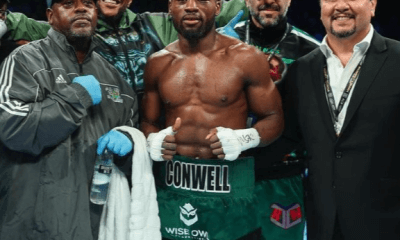
 Featured Articles4 weeks ago
Featured Articles4 weeks agoAvila Perspective, Chap. 322: Super Welterweight Week in SoCal
-
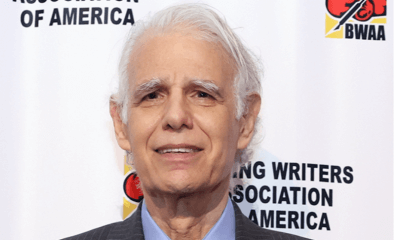
 Featured Articles4 weeks ago
Featured Articles4 weeks agoTSS Salutes Thomas Hauser and his Bernie Award Cohorts
-
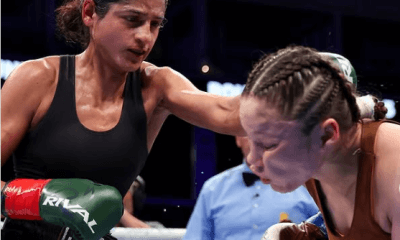
 Featured Articles3 weeks ago
Featured Articles3 weeks agoGabriela Fundora KOs Marilyn Badillo and Perez Upsets Conwell in Oceanside
-
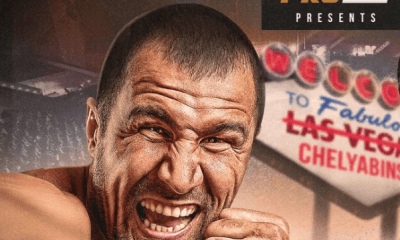
 Featured Articles4 weeks ago
Featured Articles4 weeks ago‘Krusher’ Kovalev Exits on a Winning Note: TKOs Artur Mann in his ‘Farewell Fight’
-

 Featured Articles3 weeks ago
Featured Articles3 weeks agoFloyd Mayweather has Another Phenom and his name is Curmel Moton
-
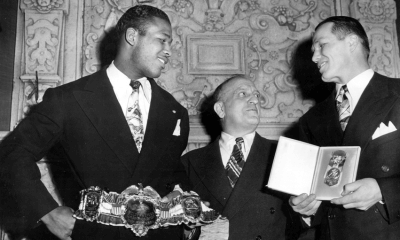
 Featured Articles3 weeks ago
Featured Articles3 weeks agoArne’s Almanac: The First Boxing Writers Assoc. of America Dinner Was Quite the Shindig
-

 Featured Articles3 weeks ago
Featured Articles3 weeks agoAvila Perspective, Chap. 323: Benn vs Eubank Family Feud and More















